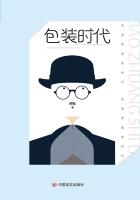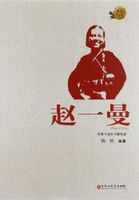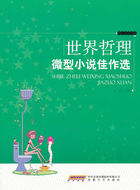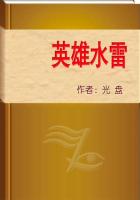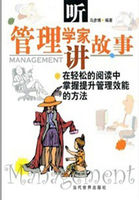AS soon as I could recover my presence of mind, which quite deserted me in the first overpowering shock of my aunt's intelligence, I proposed to Mr. **** to come round to the chandler's shop, and take possession of the bed which Mr. Peggotty had lately vacated. The chandler's shop being in Hungerford Market, and Hungerford Market being a very different place in those days, there was a low wooden colonnade before the door (not very unlike that before the house where the little man and woman used to live, in the old weather-glass), which pleased Mr. **** mightily. The glory of lodging over this structure would have compensated him, I dare say, for many inconveniences; but, as there were really few to bear, beyond the compound of flavours I have already mentioned, and perhaps the want of a little more elbow-room, he was perfectly charmed with his accommodation. Mrs. Crupp had indignantly assured him that there wasn't room to swing a cat there; but, as Mr. **** justly observed to me, sitting down on the foot of the bed, nursing his leg,‘You know, Trotwood, I don't want to swing a cat. I never do swing a cat. Therefore, what does that signify to ME!’
I tried to ascertain whether Mr. **** had any understanding of the causes of this sudden and great change in my aunt's affairs. As I might have expected, he had none at all. The only account he could give of it was, that my aunt had said to him, the day before yesterday,‘Now, ****, are you really and truly the philosopher I take you for?’That then he had said, Yes, he hoped so. That then my aunt had said,‘****, I am ruined.’That then he had said,‘Oh, indeed!’That then my aunt had praised him highly, which he was glad of. And that then they had come to me, and had had bottled porter and sandwiches on the road.
Mr. **** was so very complacent, sitting on the foot of the bed, nursing his leg, and telling me this, with his eyes wide open and a surprised smile, that I am sorry to say I was provoked into explaining to him that ruin meant distress, want, and starvation; but I was soon bitterly reproved for this harshness, by seeing his face turn pale, and tears course down his lengthened cheeks, while he fixed upon me a look of such unutterable woe, that it might have softened a far harder heart than mine. I took infinitely greater pains to cheer him up again than I had taken to depress him; and I soon understood (as I ought to have known at first) that he had been so confident, merely because of his faith in the wisest and most wonderful of women, and his unbounded reliance on my intellectual resources. The latter, I believe, he considered a match for any kind of disaster not absolutely mortal.
‘What can we do, Trotwood?’said Mr. ****.‘There's the Memorial—’
‘To be sure there is,’said I.‘But all we can do just now, Mr. ****, is to keep a cheerful countenance, and not let my aunt see that we are thinking about it.’
He assented to this in the most earnest manner; and implored me, if I should see him wandering an inch out of the right course, to recall him by some of those superior methods which were always at my command. But I regret to state that the fright I had given him proved too much for his best attempts at concealment. All the evening his eyes wandered to my aunt's face, with an expression of the most dismal apprehension, as if he saw her growing thin on the spot. He was conscious of this, and put a constraint upon his head; but his keeping that immovable, and sitting rolling his eyes like a piece of machinery, did not mend the matter at all. I saw him look at the loaf at supper (which happened to be a small one), as if nothing else stood between us and famine; and when my aunt insisted on his ****** his customary repast, I detected him in the act of pocketing fragments of his bread and cheese; I have no doubt for the purpose of reviving us with those savings, when we should have reached an advanced stage of attenuation.
My aunt, on the other hand, was in a composed frame of mind, which was a lesson to all of us—to me, I am sure. She was extremely gracious to Peggotty, except when I inadvertently called her by that name; and, strange as I knew she felt in London, appeared quite at home. She was to have my bed, and I was to lie in the sitting-room, to keep guard over her. She made a great point of being so near the river, in case of a conflagration; and I suppose really did find some satisfaction in that circumstance.
‘Trot, my dear,’said my aunt, when she saw me ****** preparations for compounding her usual night-draught,‘No!’
‘Nothing, aunt?’
‘Not wine, my dear. Ale.’
‘But there is wine here, aunt. And you always have it made of wine.’
‘Keep that, in case of sickness,’said my aunt.‘We mustn't use it carelessly, Trot. Ale for me. Half a pint.’
I thought Mr. **** would have fallen, insensible. My aunt being resolute, I went out and got the ale myself. As it was growing late, Peggotty and Mr. **** took that opportunity of repairing to the chandler's shop together. I parted from him, poor fellow, at the corner of the street, with his great kite at his back, a very monument of human misery.
My aunt was walking up and down the room when I returned, crimping the borders of her nightcap with her fingers. I warmed the ale and made the toast on the usual infallible principles. When it was ready for her, she was ready for it, with her nightcap on, and the skirt of her gown turned back on her knees.
‘My dear,’said my aunt, after taking a spoonful of it;‘it's a great deal better than wine. Not half so bilious.’
I suppose I looked doubtful, for she added:
‘Tut, tut, child. If nothing worse than Ale happens to us, we are well off.’
‘I should think so myself, aunt, I am sure,’said I.
‘Well, then, why DON'T you think so?’said my aunt.
‘Because you and I are very different people,’I returned.
‘Stuff and nonsense, Trot!’replied my aunt.
My aunt went on with a quiet enjoyment, in which there was very little affectation, if any; drinking the warm ale with a tea-spoon, and soaking her strips of toast in it.
‘Trot,’said she,‘I don't care for strange faces in general, but I rather like that Barkis of yours, do you know!’
‘It's better than a hundred pounds to hear you say so!’said I.
‘It's a most extraordinary world,’observed my aunt, rubbing her nose;‘how that woman ever got into it with that name, is unaccountable to me. It would be much more easy to be born a Jackson, or something of that sort, one would think.’
‘Perhaps she thinks so, too; it's not her fault,’said I.
‘I suppose not,’returned my aunt, rather grudging the admission;‘but it's very aggravating. However, she's Barkis now. That's some comfort. Barkis is uncommonly fond of you, Trot.’
‘There is nothing she would leave undone to prove it,’said I.
‘Nothing, I believe,’returned my aunt.‘Here, the poor fool has been begging and praying about handing over some of her money—because she has got too much of it. A ******ton!’
My aunt's tears of pleasure were positively trickling down into the warm ale.
‘She's the most ridiculous creature that ever was born,’said my aunt.‘I knew, from the first moment when I saw her with that poor dear blessed baby of a mother of yours, that she was the most ridiculous of mortals. But there are good points in Barkis!’
Affecting to laugh, she got an opportunity of putting her hand to her eyes. Having availed herself of it, she resumed her toast and her discourse together.
‘Ah! Mercy upon us!’sighed my aunt.‘I know all about it, Trot! Barkis and myself had quite a gossip while you were out with ****. I know all about it. I don't know where these wretched girls expect to go to, for my part. I wonder they don't knock out their brains against—against mantelpieces,’said my aunt; an idea which was probably suggested to her by her contemplation of mine.
‘Poor Emily!’said I.
‘Oh, don't talk to me about poor,’returned my aunt.‘She should have thought of that, before she caused so much misery! Give me a kiss, Trot. I am sorry for your early experience.’
As I bent forward, she put her tumbler on my knee to detain me, and said:
‘Oh, Trot, Trot! And so you fancy yourself in love! Do you?’
‘Fancy, aunt!’I exclaimed, as red as I could be.‘I adore her with my whole soul!’
‘Dora, indeed!’returned my aunt.‘And you mean to say the little thing is very fascinating, I suppose?’
‘My dear aunt,’I replied,‘no one can form the least idea what she is!’
‘Ah! And not silly?’said my aunt.
‘Silly, aunt!’
I seriously believe it had never once entered my head for a single moment, to consider whether she was or not. I resented the idea, of course; but I was in a manner struck by it, as a new one altogether.
‘Not light-headed?’said my aunt.
‘Light-headed, aunt!’I could only repeat this daring speculation with the same kind of feeling with which I had repeated the preceding question.
‘Well, well!’said my aunt.‘I only ask. I don't depreciate her. Poor little couple! And so you think you were formed for one another, and are to go through a party-supper-table kind of life, like two pretty pieces of confectionery, do you, Trot?’
She asked me this so kindly, and with such a gentle air, half playful and half sorrowful, that I was quite touched.
‘We are young and inexperienced, aunt, I know,’I replied;‘and I dare say we say and think a good deal that is rather foolish. But we love one another truly, I am sure. If I thought Dora could ever love anybody else, or cease to love me; or that I could ever love anybody else, or cease to love her; I don't know what I should do—go out of my mind, I think!’
‘Ah, Trot!’said my aunt, shaking her head, and smiling gravely;‘blind, blind, blind!’
‘Someone that I know, Trot,’my aunt pursued, after a pause,‘though of a very pliant disposition, has an earnestness of affection in him that reminds me of poor Baby. Earnestness is what that Somebody must look for, to sustain him and improve him, Trot. Deep, downright, faithful earnestness.’
‘If you only knew the earnestness of Dora, aunt!’I cried.
‘Oh, Trot!’she said again;‘blind, blind!’and without knowing why, I felt a vague unhappy loss or want of something overshadow me like a cloud.
‘However,’said my aunt,‘I don't want to put two young creatures out of conceit with themselves, or to make them unhappy; so, though it is a girl and boy attachment, and girl and boy attachments very often—mind! I don't say always!—come to nothing, still we'll be serious about it, and hope for a prosperous issue one of these days. There's time enough for it to come to anything!’
This was not upon the whole very comforting to a rapturous lover; but I was glad to have my aunt in my confidence, and I was mindful of her being fatigued. So I thanked her ardently for this mark of her affection, and for all her other kindnesses towards me; and after a tender good night, she took her nightcap into my bedroom.
How miserable I was, when I lay down! How I thought and thought about my being poor, in Mr. Spenlow's eyes; about my not being what I thought I was, when I proposed to Dora; about the chivalrous necessity of telling Dora what my worldly condition was, and releasing her from her engagement if she thought fit; about how I should contrive to live, during the long term of my articles, when I was earning nothing; about doing something to assist my aunt, and seeing no way of doing anything; about coming down to have no money in my pocket, and to wear a shabby coat, and to be able to carry Dora no little presents, and to ride no gallant greys, and to show myself in no agreeable light! Sordid and selfish as I knew it was, and as I tortured myself by knowing that it was, to let my mind run on my own distress so much, I was so devoted to Dora that I could not help it. I knew that it was base in me not to think more of my aunt, and less of myself; but, so far, selfishness was inseparable from Dora, and I could not put Dora on one side for any mortal creature. How exceedingly miserable I was, that night!
As to sleep, I had dreams of poverty in all sorts of shapes, but I seemed to dream without the previous ceremony of going to sleep. Now I was ragged, wanting to sell Dora matches, six bundles for a halfpenny; now I was at the office in a nightgown and boots, remonstrated with by Mr. Spenlow on appearing before the clients in that airy attire; now I was hungrily picking up the crumbs that fell from old Tiffey's daily biscuit, regularly eaten when St. Paul's struck one; now I was hopelessly endeavouring to get a licence to marry Dora, having nothing but one of Uriah Heep's gloves to offer in exchange, which the whole Commons rejected; and still, more or less conscious of my own room, I was always tossing about like a distressed ship in a sea of bed-clothes.
My aunt was restless, too, for I frequently heard her walking to and fro. Two or three times in the course of the night, attired in a long flannel wrapper in which she looked seven feet high, she appeared, like a disturbed ghost, in my room, and came to the side of the sofa on which I lay. On the first occasion I started up in alarm, to learn that she inferred from a particular light in the sky, that Westminster Abbey was on fire; and to be consulted in reference to the probability of its igniting Buckingham Street, in case the wind changed. Lying still, after that, I found that she sat down near me, whispering to herself‘Poor boy!’And then it made me twenty times more wretched, to know how unselfishly mindful she was of me, and how selfishly mindful I was of myself.
It was difficult to believe that a night so long to me, could be short to anybody else. This consideration set me thinking and thinking of an imaginary party where people were dancing the hours away, until that became a dream too, and I heard the music incessantly playing one tune, and saw Dora incessantly dancing one dance, without taking the least notice of me. The man who had been playing the harp all night, was trying in vain to cover it with an ordinary-sized nightcap, when I awoke; or I should rather say, when I left off trying to go to sleep, and saw the sun shining in through the window at last.
There was an old Roman bath in those days at the bottom of one of the streets out of the Strand—it may be there still—in which I have had many a cold plunge. Dressing myself as quietly as I could, and leaving Peggotty to look after my aunt, I tumbled head foremost into it, and then went for a walk to Hampstead. I had a hope that this brisk treatment might freshen my wits a little; and I think it did them good, for I soon came to the conclusion that the first step I ought to take was, to try if my articles could be cancelled and the premium recovered. I got some breakfast on the Heath, and walked back to Doctors' Commons, along the watered roads and through a pleasant smell of summer flowers, growing in gardens and carried into town on hucksters' heads, intent on this first effort to meet our altered circumstances.
I arrived at the office so soon, after all, that I had half an hour's loitering about the Commons, before old Tiffey, who was always first, appeared with his key. Then I sat down in my shady corner, looking up at the sunlight on the opposite chimney-pots, and thinking about Dora; until Mr. Spenlow came in, crisp and curly.
‘How are you, Copperfield?’said he.‘Fine morning!’
‘Beautiful morning, sir,’said I.‘Could I say a word to you before you go into Court?’
‘By all means,’said he.‘Come into my room.’
I followed him into his room, and he began putting on his gown, and touching himself up before a little glass he had, hanging inside a closet door.
‘I am sorry to say,’said I,‘that I have some rather disheartening intelligence from my aunt.’
‘No!’said he.‘Dear me! Not paralysis, I hope?’
‘It has no reference to her health, sir,’I replied.‘She has met with some large losses. In fact, she has very little left, indeed.’
‘You astound me, Copperfield!’cried Mr. Spenlow.
I shook my head.‘Indeed, sir,’said I,‘her affairs are so changed, that I wished to ask you whether it would be possible—at a sacrifice on our part of some portion of the premium, of course,’I put in this, on the spur of the moment, warned by the blank expression of his face—‘to cancel my articles?’
What it cost me to make this proposal, nobody knows. It was like asking, as a favour, to be sentenced to transportation from Dora.
‘To cancel your articles, Copperfield? Cancel?’
I explained with tolerable firmness, that I really did not know where my means of subsistence were to come from, unless I could earn them for myself. I had no fear for the future, I said—and I laid great emphasis on that, as if to imply that I should still be decidedly eligible for a son-in-law one of these days—but, for the present, I was thrown upon my own resources.‘I am extremely sorry to hear this, Copperfield,’said Mr. Spenlow.‘Extremely sorry. It is not usual to cancel articles for any such reason. It is not a professional course of proceeding. It is not a convenient precedent at all. Far from it. At the same time—’
‘You are very good, sir,’I murmured, anticipating a concession.
‘Not at all. Don't mention it,’said Mr. Spenlow.‘At the same time, I was going to say, if it had been my lot to have my hands unfettered—if I had not a partner—Mr. Jorkins—’
My hopes were dashed in a moment, but I made another effort.
‘Do you think, sir,’said I,‘if I were to mention it to Mr. Jorkins—’
Mr. Spenlow shook his head discouragingly.‘Heaven forbid, Copperfield,’he replied,‘that I should do any man an injustice: still less, Mr. jorkins. But I know my partner, Copperfield. Mr. jorkins is not a man to respond to a proposition of this peculiar nature. Mr. jorkins is very difficult to move from the beaten track. You know what he is!’
I am sure I knew nothing about him, except that he had originally been alone in the business, and now lived by himself in a house near Montagu Square, which was fearfully in want of painting; that he came very late of a day, and went away very early; that he never appeared to be consulted about anything; and that he had a dingy little black-hole of his own upstairs, where no business was ever done, and where there was a yellow old cartridge-paper pad upon his desk, unsoiled by ink, and reported to be twenty years of age.
‘Would you object to my mentioning it to him, sir?’I asked.
‘By no means,’said Mr. Spenlow.‘But I have some experience of Mr. jorkins, Copperfield. I wish it were otherwise, for I should be happy to meet your views in any respect. I cannot have the objection to your mentioning it to Mr. jorkins, Copperfield, if you think it worth while.’
Availing myself of this permission, which was given with a warm shake of the hand, I sat thinking about Dora, and looking at the sunlight stealing from the chimney-pots down the wall of the opposite house, until Mr. jorkins came. I then went up to Mr. jorkins's room, and evidently astonished Mr. jorkins very much by ****** my appearance there.
‘Come in, Mr. Copperfield,’said Mr. jorkins.‘Come in!’
I went in, and sat down; and stated my case to Mr. jorkins pretty much as I had stated it to Mr. Spenlow. Mr. Jorkins was not by any means the awful creature one might have expected, but a large, mild, smooth-faced man of sixty, who took so much snuff that there was a tradition in the Commons that he lived principally on that stimulant, having little room in his system for any other article of diet.
‘You have mentioned this to Mr. Spenlow, I suppose?’said Mr. jorkins; when he had heard me, very restlessly, to an end.
I answered Yes, and told him that Mr. Spenlow had introduced his name.
‘He said I should object?’asked Mr. jorkins.
I was obliged to admit that Mr. Spenlow had considered it probable.
‘I am sorry to say, Mr. Copperfield, I can't advance your object,’said Mr. jorkins, nervously.‘The fact is—but I have an appointment at the Bank, if you'll have the goodness to excuse me.’
With that he rose in a great hurry, and was going out of the room, when I made bold to say that I feared, then, there was no way of arranging the matter?
‘No!’said Mr. jorkins, stopping at the door to shake his head.‘Oh, no! I object, you know,’which he said very rapidly, and went out.‘You must be aware, Mr. Copperfield,’he added, looking restlessly in at the door again,‘if Mr. Spenlow objects—’
‘Personally, he does not object, sir,’said I.
‘Oh! Personally!’repeated Mr. Jorkins, in an impatient manner.‘I assure you there's an objection, Mr. Copperfield. Hopeless! What you wish to be done, can't be done. I—I really have got an appointment at the Bank.’With that he fairly ran away; and to the best of my knowledge, it was three days before he showed himself in the Commons again.
Being very anxious to leave no stone unturned, I waited until Mr. Spenlow came in, and then described what had passed; giving him to understand that I was not hopeless of his being able to soften the adamantine jorkins, if he would undertake the task.
‘Copperfield,’returned Mr. Spenlow, with a gracious smile,‘you have not known my partner, Mr. jorkins, as long as I have. Nothing is farther from my thoughts than to attribute any degree of artifice to Mr. jorkins. But Mr. jorkins has a way of stating his objections which often deceives people. No, Copperfield!’shaking his head.‘Mr. jorkins is not to be moved, believe me!’
I was completely bewildered between Mr. Spenlow and Mr. jorkins, as to which of them really was the objecting partner; but I saw with sufficient clearness that there was obduracy somewhere in the firm, and that the recovery of my aunt's thousand pounds was out of the question. In a state of despondency, which I remember with anything but satisfaction, for I know it still had too much reference to myself (though always in connexion with Dora), I left the office, and went homeward.
I was trying to familiarize my mind with the worst, and to present to myself the arrangements we should have to make for the future in their sternest aspect, when a hackney-chariot coming after me, and stopping at my very feet, occasioned me to look up. A fair hand was stretched forth to me from the window; and the face I had never seen without a feeling of serenity and happiness, from the moment when it first turned back on the old oak staircase with the great broad balustrade, and when I associated its softened beauty with the stained-glass window in the church, was smiling on me.
‘Agnes!’I joyfully exclaimed.‘Oh, my dear Agnes, of all people in the world, what a pleasure to see you!’
‘Is it, indeed?’she said, in her cordial voice.
‘I want to talk to you so much!’said I.‘It's such a lightening of my heart, only to look at you! If I had had a conjuror's cap, there is no one I should have wished for but you!’
‘What?’returned Agnes.
‘Well! perhaps Dora first,’I admitted, with a blush.
‘Certainly, Dora first, I hope,’said Agnes, laughing.
‘But you next!’said I.‘Where are you going?’
She was going to my rooms to see my aunt. The day being very fine, she was glad to come out of the chariot, which smelt (I had my head in it all this time) like a stable put under a cucumber-frame. I dismissed the coachman, and she took my arm, and we walked on together. She was like Hope embodied, to me. How different I felt in one short minute, having Agnes at my side!
My aunt had written her one of the odd, abrupt notes—very little longer than a Bank note—to which her epistolary efforts were usually limited. She had stated therein that she had fallen into adversity, and was leaving Dover for good, but had quite made up her mind to it, and was so well that nobody need be uncomfortable about her. Agnes had come to London to see my aunt, between whom and herself there had been a mutual liking these many years: indeed, it dated from the time of my taking up my residence in Mr. Wickfield's house. She was not alone, she said. Her papa was with her—and Uriah Heep.
‘And now they are partners,’said I.‘Confound him!’
‘Yes,’said Agnes.‘They have some business here; and I took advantage of their coming, to come too. You must not think my visit all friendly and disinterested, Trotwood, for—I am afraid I may be cruelly prejudiced—I do not like to let papa go away alone, with him.’
‘Does he exercise the same influence over Mr. Wickfield still, Agnes?’
Agnes shook her head.‘There is such a change at home,’said she,‘that you would scarcely know the dear old house. They live with us now.’
‘They?’said I.
‘Mr. Heep and his mother. He sleeps in your old room,’said Agnes, looking up into my face.
‘I wish I had the ordering of his dreams,’said I.‘He wouldn't sleep there long.’
‘I keep my own little room,’said Agnes,‘where I used to learn my lessons. How the time goes! You remember? The little panelled room that opens from the drawing-room?’
‘Remember, Agnes? When I saw you, for the first time, coming out at the door, with your quaint little basket of keys hanging at your side?’
‘It is just the same,’said Agnes, smiling.‘I am glad you think of it so pleasantly. We were very happy.’
‘We were, indeed,’said I.
‘I keep that room to myself still; but I cannot always desert Mrs. Heep, you know. And so,’said Agnes, quietly,‘I feel obliged to bear her company, when I might prefer to be alone. But I have no other reason to complain of her. If she tires me, sometimes, by her praises of her son, it is only natural in a mother. He is a very good son to her.’
I looked at Agnes when she said these words, without detecting in her any consciousness of Uriah's design. Her mild but earnest eyes met mine with their own beautiful frankness, and there was no change in her gentle face.
‘The chief evil of their presence in the house,’said Agnes,‘is that I cannot be as near papa as I could wish—Uriah Heep being so much between us—and cannot watch over him, if that is not too bold a thing to say, as closely as I would. But if any fraud or treachery is practising against him, I hope that ****** love and truth will be strong in the end. I hope that real love and truth are stronger in the end than any evil or misfortune in the world.’
A certain bright smile, which I never saw on any other face, died away, even while I thought how good it was, and how familiar it had once been to me; and she asked me, with a quick change of expression (we were drawing very near my street), if I knew how the reverse in my aunt's circumstances had been brought about. On my replying no, she had not told me yet, Agnes became thoughtful, and I fancied I felt her arm tremble in mine.
We found my aunt alone, in a state of some excitement. A difference of opinion had arisen between herself and Mrs. Crupp, on an abstract question (the propriety of chambers being inhabited by the gentler ***); and my aunt, utterly indifferent to spasms on the part of Mrs. Crupp, had cut the dispute short, by informing that lady that she smelt of my brandy, and that she would trouble her to walk out. Both of these expressions Mrs. Crupp considered actionable, and had expressed her intention of bringing before a‘British Judy’—meaning, it was supposed, the bulwark of our national liberties.
My aunt, however, having had time to cool, while Peggotty was out showing Mr. **** the soldiers at the Horse Guards—and being, besides, greatly pleased to see Agnes—rather plumed herself on the affair than otherwise, and received us with unimpaired good humour. When Agnes laid her bonnet on the table, and sat down beside her, I could not but think, looking on her mild eyes and her radiant forehead, how natural it seemed to have her there; how trustfully, although she was so young and inexperienced, my aunt confided in her; how strong she was, indeed, in ****** love and truth.
We began to talk about my aunt's losses, and I told them what I had tried to do that morning.
‘Which was injudicious, Trot,’said my aunt,‘but well meant. You are a generous boy—I suppose I must say, young man, now—and I am proud of you, my dear. So far, so good. Now, Trot and Agnes, let us look the case of Betsey Trotwood in the face, and see how it stands.’
I observed Agnes turn pale, as she looked very attentively at my aunt. My aunt, patting her cat, looked very attentively at Agnes.
‘Betsey Trotwood,’said my aunt, who had always kept her money matters to herself.‘—I don't mean your sister, Trot, my dear, but myself—had a certain property. It don't matter how much; enough to live on. More; for she had saved a little, and added to it. Betsey funded her property for some time, and then, by the advice of her man of business, laid it out on landed security. That did very well, and returned very good interest, till Betsey was paid off. I am talking of Betsey as if she was a man-of-war. Well! Then, Betsey had to look about her, for a new investment. She thought she was wiser, now, than her man of business, who was not such a good man of business by this time, as he used to be—I am alluding to your father, Agnes—and she took it into her head to lay it out for herself. So she took her pigs,’said my aunt,‘to a foreign market; and a very bad market it turned out to be. First, she lost in the mining way, and then she lost in the diving way—fishing up treasure, or some such Tom Tiddler nonsense,’explained my aunt, rubbing her nose;‘and then she lost in the mining way again, and, last of all, to set the thing entirely to rights, she lost in the banking way. I don't know what the Bank shares were worth for a little while,’said my aunt;‘cent per cent was the lowest of it, I believe; but the Bank was at the other end of the world, and tumbled into space, for what I know; anyhow, it fell to pieces, and never will and never can pay sixpence; and Betsey's sixpences were all there, and there's an end of them. Least said, soonest mended!’
My aunt concluded this philosophical summary, by fixing her eyes with a kind of triumph on Agnes, whose colour was gradually returning.
‘Dear Miss Trotwood, is that all the history?’said Agnes.
‘I hope it's enough, child,’said my aunt.‘If there had been more money to lose, it wouldn't have been all, I dare say. Betsey would have contrived to throw that after the rest, and make another chapter, I have little doubt. But there was no more money, and there's no more story.’
Agnes had listened at first with suspended breath. Her colour still came and went, but she breathed more freely. I thought I knew why. I thought she had had some fear that her unhappy father might be in some way to blame for what had happened. My aunt took her hand in hers, and laughed.
‘Is that all?’repeated my aunt.‘Why, yes, that's all, except,“And she lived happy ever afterwards.”Perhaps I may add that of Betsey yet, one of these days. Now, Agnes, you have a wise head. So have you, Trot, in some things, though I can't compliment you always’; and here my aunt shook her own at me, with an energy peculiar to herself.‘What's to be done? Here's the cottage, taking one time with another, will produce say seventy pounds a year. I think we may safely put it down at that. Well!—That's all we've got,’said my aunt; with whom it was an idiosyncrasy, as it is with some horses, to stop very short when she appeared to be in a fair way of going on for a long while.
‘Then,’said my aunt, after a rest,‘there's ****. He's good for a hundred a-year, but of course that must be expended on himself. I would sooner send him away, though I know I am the only person who appreciates him, than have him, and not spend his money on himself. How can Trot and I do best, upon our means? What do you say, Agnes?’
‘I say, aunt,’I interposed,‘that I must do something!’
‘Go for a soldier, do you mean?’returned my aunt, alarmed;‘or go to sea? I won't hear of it. You are to be a proctor. We're not going to have any knockings on the head in THIS family, if you please, sir.’
I was about to explain that I was not desirous of introducing that mode of provision into the family, when Agnes inquired if my rooms were held for any long term?
‘You come to the point, my dear,’said my aunt.‘They are not to be got rid of, for six months at least, unless they could be underlet, and that I don't believe. The last man died here. Five people out of six would die—of course—of that woman in nankeen with the flannel petticoat. I have a little ready money; and I agree with you, the best thing we can do, is, to live the term out here, and get a bedroom hard by.’
I thought it my duty to hint at the discomfort my aunt would sustain, from living in a continual state of guerilla warfare with Mrs. Crupp; but she disposed of that objection summarily by declaring that, on the first demonstration of hostilities, she was prepared to astonish Mrs. Crupp for the whole remainder of her natural life.
‘I have been thinking, Trotwood,’said Agnes, diffidently,‘that if you had time—’
‘I have a good deal of time, Agnes. I am always disengaged after four or five o'clock, and I have time early in the morning. In one way and another,’said I, conscious of reddening a little as I thought of the hours and hours I had devoted to fagging about town, and to and fro upon the Norwood Road,‘I have abundance of time.’
‘I know you would not mind,’said Agnes, coming to me, and speaking in a low voice, so full of sweet and hopeful consideration that I hear it now,‘the duties of a secretary.’
‘Mind, my dear Agnes?’
‘Because,’continued Agnes,‘Doctor Strong has acted on his intention of retiring, and has come to live in London; and he asked papa, I know, if he could recommend him one. Don't you think he would rather have his favourite old pupil near him, than anybody else?’
‘Dear Agnes!’said I.‘What should I do without you! You are always my good angel. I told you so. I never think of you in any other light.’
Agnes answered with her pleasant laugh, that one good Angel (meaning Dora) was enough; and went on to remind me that the Doctor had been used to occupy himself in his study, early in the morning, and in the evening—and that probably my leisure would suit his requirements very well. I was scarcely more delighted with the prospect of earning my own bread, than with the hope of earning it under my old master; in short, acting on the advice of Agnes, I sat down and wrote a letter to the Doctor, stating my object, and appointing to call on him next day at ten in the forenoon. This I addressed to Highgate—for in that place, so memorable to me, he lived—and went and posted, myself, without losing a minute.
Wherever Agnes was, some agreeable token of her noiseless presence seemed inseparable from the place. When I came back, I found my aunt's birds hanging, just as they had hung so long in the parlour window of the cottage; and my easy-chair imitating my aunt's much easier chair in its position at the open window; and even the round green fan, which my aunt had brought away with her, screwed on to the window-sill. I knew who had done all this, by its seeming to have quietly done itself; and I should have known in a moment who had arranged my neglected books in the old order of my school days, even if I had supposed Agnes to be miles away, instead of seeing her busy with them, and smiling at the disorder into which they had fallen.
My aunt was quite gracious on the subject of the Thames (it really did look very well with the sun upon it, though not like the sea before the cottage), but she could not relent towards the London smoke, which, she said,‘peppered everything’. A complete revolution, in which Peggotty bore a prominent part, was being effected in every corner of my rooms, in regard of this pepper; and I was looking on, thinking how little even Peggotty seemed to do with a good deal of bustle, and how much Agnes did without any bustle at all, when a knock came at the door.
‘I think,’said Agnes, turning pale,‘it's papa. He promised me that he would come.’
I opened the door, and admitted, not only Mr. Wickfield, but Uriah Heep. I had not seen Mr. Wickfield for some time. I was prepared for a great change in him, after what I had heard from Agnes, but his appearance shocked me.
It was not that he looked many years older, though still dressed with the old scrupulous cleanliness; or that there was an unwholesome ruddiness upon his face; or that his eyes were full and bloodshot; or that there was a nervous trembling in his hand, the cause of which I knew, and had for some years seen at work. It was not that he had lost his good looks, or his old bearing of a gentleman—for that he had not—but the thing that struck me most, was, that with the evidences of his native superiority still upon him, he should submit himself to that crawling impersonation of meanness, Uriah Heep. The reversal of the two natures, in their relative positions, Uriah's of power and Mr. Wickfield's of dependence, was a sight more painful to me than I can express. If I had seen an Ape taking command of a Man, I should hardly have thought it a more degrading spectacle.
He appeared to be only too conscious of it himself. When he came in, he stood still; and with his head bowed, as if he felt it. This was only for a moment; for Agnes softly said to him,‘Papa! Here is Miss Trotwood—and Trotwood, whom you have not seen for a long while!’and then he approached, and constrainedly gave my aunt his hand, and shook hands more cordially with me. In the moment's pause I speak of, I saw Uriah's countenance form itself into a most ill-favoured smile. Agnes saw it too, I think, for she shrank from him.
What my aunt saw, or did not see, I defy the science of physiognomy to have made out, without her own consent. I believe there never was anybody with such an imperturbable countenance when she chose. Her face might have been a dead-wall on the occasion in question, for any light it threw upon her thoughts; until she broke silence with her usual abruptness.
‘Well, Wickfield!’said my aunt; and he looked up at her for the first time.‘I have been telling your daughter how well I have been disposing of my money for myself, because I couldn't trust it to you, as you were growing rusty in business matters. We have been taking counsel together, and getting on very well, all things considered. Agnes is worth the whole firm, in my opinion.’
‘If I may umbly make the remark,’said Uriah Heep, with a writhe,‘I fully agree with Miss Betsey Trotwood, and should be only too appy if Miss Agnes was a partner.’
‘You're a partner yourself, you know,’returned my aunt,‘and that's about enough for you, I expect. How do you find yourself, sir?’
In acknowledgement of this question, addressed to him with extraordinary curtness, Mr. Heep, uncomfortably clutching the blue bag he carried, replied that he was pretty well, he thanked my aunt, and hoped she was the same.
‘And you, Master—I should say, Mister Copperfield,’pursued Uriah.‘I hope I see you well! I am rejoiced to see you, Mister Copperfield, even under present circumstances.’I believed that; for he seemed to relish them very much.‘Present circumstances is not what your friends would wish for you, Mister Copperfield, but it isn't money makes the man: it's—I am really unequal with my umble powers to express what it is,’said Uriah, with a fawning jerk,‘but it isn't money!’
Here he shook hands with me: not in the common way, but standing at a good distance from me, and lifting my hand up and down like a pump handle, that he was a little afraid of.
‘And how do you think we are looking, Master Copperfield,—I should say, Mister?’fawned Uriah.‘Don't you find Mr. Wickfield blooming, sir? Years don't tell much in our firm, Master Copperfield, except in raising up the umble, namely, mother and self—and in developing,’he added, as an afterthought,‘the beautiful, namely, Miss Agnes.’
He jerked himself about, after this compliment, in such an intolerable manner, that my aunt, who had sat looking straight at him, lost all patience.
‘Deuce take the man!’said my aunt, sternly,‘what's he about? Don't be galvanic, sir!’
‘I ask your pardon, Miss Trotwood,’returned Uriah;‘I'm aware you're nervous.’
‘Go along with you, sir!’said my aunt, anything but appeased.‘Don't presume to say so! I am nothing of the sort. If you're an eel, sir, conduct yourself like one. If you're a man, control your limbs, sir! Good God!’said my aunt, with great indignation,‘I am not going to be serpentined and corkscrewed out of my senses!’
Mr. Heep was rather abashed, as most people might have been, by this explosion; which derived great additional force from the indignant manner in which my aunt afterwards moved in her chair, and shook her head as if she were ****** snaps or bounces at him. But he said to me aside in a meek voice:
‘I am well aware, Master Copperfield, that Miss Trotwood, though an excellent lady, has a quick temper (indeed I think I had the pleasure of knowing her, when I was a numble clerk, before you did, Master Copperfield), and it's only natural, I am sure, that it should be made quicker by present circumstances. The wonder is, that it isn't much worse! I only called to say that if there was anything we could do, in present circumstances, mother or self, or Wickfield and Heep,—we should be really glad. I may go so far?’said Uriah, with a sickly smile at his partner.
‘Uriah Heep,’said Mr. Wickfield, in a monotonous forced way,‘is active in the business, Trotwood. What he says, I quite concur in. You know I had an old interest in you. Apart from that, what Uriah says I quite concur in!’
‘Oh, what a reward it is,’said Uriah, drawing up one leg, at the risk of bringing down upon himself another visitation from my aunt,‘to be so trusted in! But I hope I am able to do something to relieve him from the fatigues of business, Master Copperfield!’
‘Uriah Heep is a great relief to me,’said Mr. Wickfield, in the same dull voice.‘It's a load off my mind, Trotwood, to have such a partner.’
The red fox made him say all this, I knew, to exhibit him to me in the light he had indicated on the night when he poisoned my rest. I saw the same ill-favoured smile upon his face again, and saw how he watched me.
‘You are not going, papa?’said Agnes, anxiously.‘Will you not walk back with Trotwood and me?’
He would have looked to Uriah, I believe, before replying, if that worthy had not anticipated him.
‘I am bespoke myself,’said Uriah,‘on business; otherwise I should have been appy to have kept with my friends. But I leave my partner to represent the firm. Miss Agnes, ever yours! I wish you good-day, Master Copperfield, and leave my umble respects for Miss Betsey Trotwood.’
With those words, he retired, kissing his great hand, and leering at us like a mask.
We sat there, talking about our pleasant old Canterbury days, an hour or two. Mr. Wickfield, left to Agnes, soon became more like his former self; though there was a settled depression upon him, which he never shook off. For all that, he brightened; and had an evident pleasure in hearing us recall the little incidents of our old life, many of which he remembered very well. He said it was like those times, to be alone with Agnes and me again; and he wished to Heaven they had never changed. I am sure there was an influence in the placid face of Agnes, and in the very touch of her hand upon his arm, that did wonders for him.
My aunt (who was busy nearly all this while with Peggotty, in the inner room) would not accompany us to the place where they were staying, but insisted on my going; and I went. We dined together. After dinner, Agnes sat beside him, as of old, and poured out his wine. He took what she gave him, and no more—like a child—and we all three sat together at a window as the evening gathered in. When it was almost dark, he lay down on a sofa, Agnes pillowing his head and bending over him a little while; and when she came back to the window, it was not so dark but I could see tears glittering in her eyes.
I pray Heaven that I never may forget the dear girl in her love and truth, at that time of my life; for if I should, I must be drawing near the end, and then I would desire to remember her best! She filled my heart with such good resolutions, strengthened my weakness so, by her example, so directed—I know not how, she was too modest and gentle to advise me in many words—the wandering ardour and unsettled purpose within me, that all the little good I have done, and all the harm I have forborne, I solemnly believe I may refer to her.
And how she spoke to me of Dora, sitting at the window in the dark; listened to my praises of her; praised again; and round the little fairy-figure shed some glimpses of her own pure light, that made it yet more precious and more innocent to me! Oh, Agnes, sister of my boyhood, if I had known then, what I knew long afterwards—!
There was a beggar in the street, when I went down; and as I turned my head towards the window, thinking of her calm seraphic eyes, he made me start by muttering, as if he were an echo of the morning:‘Blind! Blind! Blind!’

